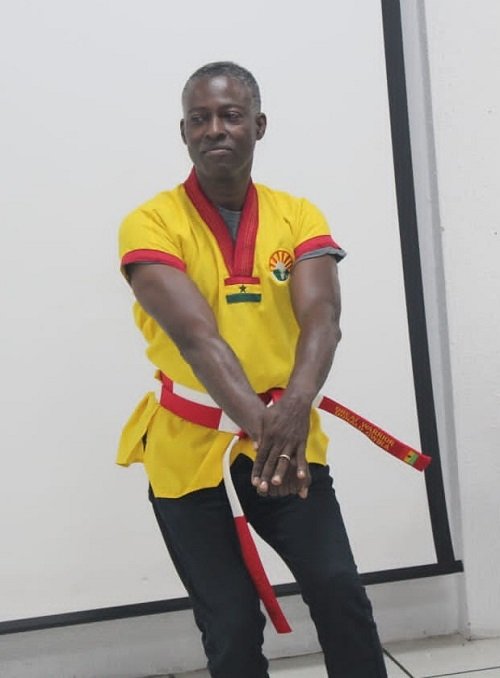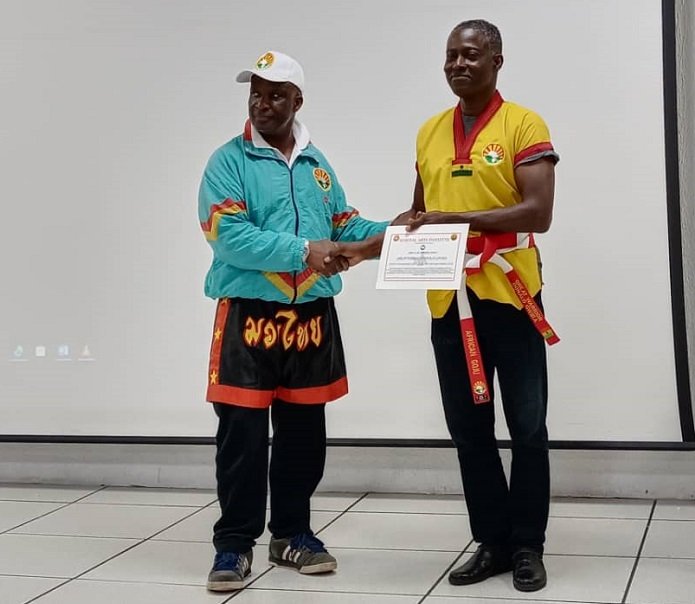Hot!
Celebrating legends …Donald Gwira gets Seventh Degree Black Belt in African Goju

Communication Professional and Martial Arts Practitioner, Mr Donald Gwira, was part of 26 outstanding personalities recognised at the African Goju Awards held last Saturday in Accra by the Martial Arts institute.
He was named a Patron and awarded Seventh Degree Black Belt for attaining “the required level of fitness, attack-defence, ‘katas’ and fighting techniques” in African Goju.

He was again inducted into the Ken Gwira Hall of Fame for his contribution to the history and development of the Martial Arts Institute, African Goju and South American Goju.
With over 40 years experience in the discipline which teaches self-defense and other positive values, Mr Gwira obtained First Degree Black Belt in 1979 and Fifth Degree Black Belt in 1995.
His sharp tactics and contribution to the development of African Goju in Ghana, France and the United States of America (USA) led to his induction into the Hall of Fame of the Martial Arts Institute in 2010.
This notwithstanding, the ‘Great Warrior’ and ‘Flying Kick specialist’ told The Spectator last year that he was aiming to attain the highest degree possible. And true to his words, he continued to put in the effort and is now closer to reaching the ultimate.
“It is a great honour to be promoted. It gives me encouragement to go higher and possibly reach the 10th Degree Black Belt which is the highest level.
“I will continue to train and keep fit; keeping fit is a way of life and it has helped me over the years,” Mr Gwira said after receiving the award.
He added that he intended working with other Martial Artists to groom more young people to become “great warriors.”
The ceremony, according to Prof. Danny Gwira, Founder of the Martial Arts Institute, African and South American Goju, was to celebrate the sacrifices and continuous support of members to the growth of the institute.
He said African Goju, an indigenous style of Martial Arts, was not only about building physical strength but also the holistic development of an individual.
“African Goju among other things teaches you how to avoid a fight because it does not matter how strong, tough or skillful you are, you can still be beaten by a determined opponent,” he said.
African Goju was formed in Ghana in 1985 by Danny Gwira, a student of Professor Ron Van Clief the Founder of Chinese Goju.
However, Danny later realised that some of the techniques in Chinese Goju were not applicable to the African context hence the commencement of a “more realistic style” that teaches people to “stay alive and win any battle.”
The concept had since been extended to other parts of the world including Nigeria, England, Switzerland and Bolivia.
Other awardees included Former Trade Minister, Mr. Ekow Spio-Garbrah, who received the Honorary Black Belt while the Martial Artist of the Year award went to Mr. Partick Mintah.
By Ernest Nutsugah
Hot!
Annoh Dompreh raises alarm over DACF arrears, calls for payment of contractors

The Member of Parliament for Nsawam Adoagyiri, Frank Annoh Dompreh, has expressed concern over delays in the release of the District Assemblies Common Fund, warning that the situation is stalling development across the country.
On his facebook page, he described as a matter of urgent national importance, the Minority Chief Whip pointed to what he sees as a growing crisis of unpaid contractors, abandoned projects, and halted infrastructure works in many districts.
He noted that several communities are grappling with half completed schools, unfinished health facilities, abandoned markets, deteriorating roads, and stalled sanitation projects.
According to him, many contractors who have executed projects for district assemblies have not been paid, forcing some construction firms to demobilise from sites while workers lose their jobs.
He stressed that the District Assemblies Common Fund is not a discretionary allocation but a constitutional requirement under Article 252 of the 1992 Constitution, intended to support development at the local level.
In his view, years of delayed releases and accumulated arrears have weakened district development financing and disrupted projects meant to improve living conditions in communities.
He further argued that some payments made in recent years were largely the settlement of old debts rather than funding for new or ongoing projects, a situation he believes has affected contractor confidence and local economic activity.
He described the issue as more than a budgetary challenge, characterising it as a development emergency and a governance concern.
He therefore urged the appropriate authorities to pay outstanding DACF arrears, settle contractors who have completed their work, and ensure that transfers to districts are automatic and predictable.
He maintained that decentralisation can only succeed when district assemblies receive adequate and timely funding to carry out development projects.
He emphasised that stalled projects directly affect ordinary citizens, since they rely on such infrastructure for education, healthcare, transportation, sanitation, and economic activities.
He called for renewed attention to grassroots development, insisting that national progress should not be concentrated only in major cities but extended to all communities.
By: Jacob Aggrey
Hot!
Breaking: Footballer who killed two children in Abesim handed lifetime sentence

Richard Appiah, the footballer who killed two children and stored part of their bodies in a fridge at Abesim in the Bono Region in 2021 has been handed a lifetime sentence.
This was after a five member panel of judges at the Accra High Court returned a verdict of guilty against the convict.
Appiah, 32, also a draughtsman would spend the rest of his life in prison after he was convicted of murder.
More more more
BY MALIK SULLEMANA






